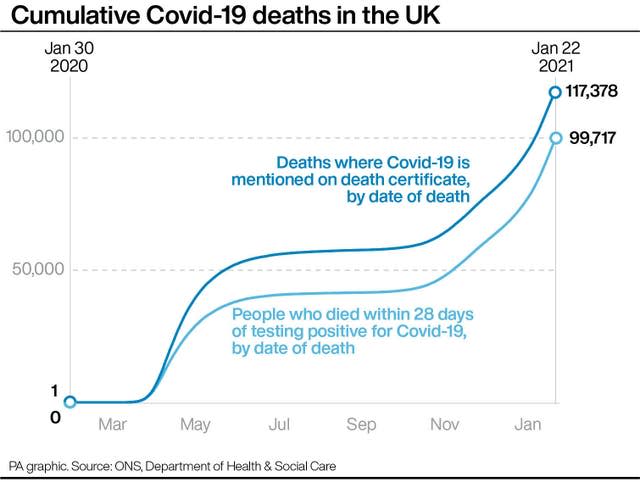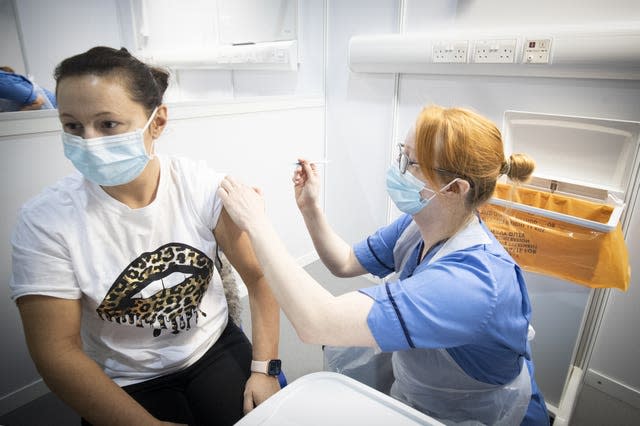Phased return to schools for some youngsters as Scotland’s lockdown extended
Nicola Sturgeon has announced the start of a phased return to school for some youngsters – despite extending Scotland’s lockdown till at least the end of February.
The First Minister warned Scots measures such as physical distancing and face coverings may be “necessary for a while yet” – as she also told them the price of any “greater normality” at home was “likely to be, for a period at least – not going on holiday overseas”.
While the current lockdown has been extended for a second time, it is hoped P1-P3 pupils will return to school from February 22, along with nurseries.
Senior high school pupils could also return from then, although they will only be in classes part-time “on a very limited basis” to do practical work necessary for their courses.
To help achieve this, the First Minister promised there would be a “significant expansion of testing in educational settings to support the return to nurseries and schools in the weeks ahead”.
Lockdown restrictions have been extended following this week's review.
Current lockdown measures will stay in place across mainland Scotland and some island communities until at least the end of February.
Know the rules for your area ➡ https://t.co/TIe3CyvNqa pic.twitter.com/mA54ZlnoWd
— Scottish Government (@scotgov) February 2, 2021
Ms Sturgeon said: “We are determined to get our children back to normal schooling – and by extension back to much greater normality in their lives – just as quickly as it is safe to do so.
“That is our overriding priority and I think it is right it is the overriding priority of all of us.”
The Scottish Government will confirm in two weeks’ time if it will be possible for these children to return to their classrooms – with ministers also hoping to announce then when other students could go back.
But the start of a phased return to schools comes as Ms Sturgeon confirmed lockdown restrictions in Scotland were being extended.
The First Minister said the measures – which are in place across the Scottish mainland and some of the islands – were working, with average daily case numbers having more than halved in the last three weeks.
But she also stressed that “the situation continues to be fragile”.

The new, faster spreading strain of Covid-19 now accounts for almost three quarters of cases, with experts at Public Health Scotland looking at evidence which indicates it may carry “an increased risk of hospitalisation”.
To help counter the possibility of new strains of the virus being imported into Scotland from abroad, Ms Sturgeon announced that anyone who arrives directly into Scotland will have to undergo a “managed quarantine”.
More details of this, including the date that such measures will come into force, will be announced later.
The First Minister also pledged greater use of community testing, in a bid to find more Covid-19 cases.
Regular testing of those providing primary health care – such as GPs, dentists, pharmacists and optometrists – will start later this month, along with routine testing for hospice staff.
The Scottish Government is also working with businesses in those industries with higher transmission risks – such as food production and distribution – in order to establish routine worker testing.
And by the end of this week, Ms Sturgeon said community testing plans – where those without symptoms can be checked – would be agreed for the “majority of mainland local authority areas”.
To encourage more people to self-isolate when needed, the First Minister promised eligibility for a special £500 payment would be extended, to benefit everyone earning less than the real living wage.

With the latest figures showing 69 further coronavirus deaths and 758 new cases in the past 24 hours, Ms Sturgeon insisted Scotland was “making progress”.
But she was also cautious, saying: “The path ahead remains difficult, I think it is important to be candid about that.
“The virus is still circulating not just here but across the UK, Europe and the world – and of even greater concern right now, the virus is mutating.
“So we must remain vigilant and we must remain disciplined.”
She said that even when Scotland was “able to start the process of slowly easing lockdown”, people would “have to accept that some mitigations, like physical distancing and face coverings, will be necessary for a while yet”.
Ms Sturgeon added: “I am afraid we will also have to accept that the price of greater domestic normality is likely to be, for a period at least, not going on holiday overseas.”
Her comments came as Scottish Labour interim leader Jackie Baillie raised concerns about the impact of having schools closed to most youngsters.
She said: “Almost a year into this pandemic we are all too aware of the negative impact lockdown and school closures are having on children and young people.”
Ms Baillie said research by the Institute of Fiscal Studies found “by the time the pandemic is over most children will have missed more than half a year of normal in person schooling” – and that this could cost them as much as £40,000 in lost earnings over their lifetimes.
“The effect of Covid on lost learning could translate into lower incomes and higher inequality,” she warned.


